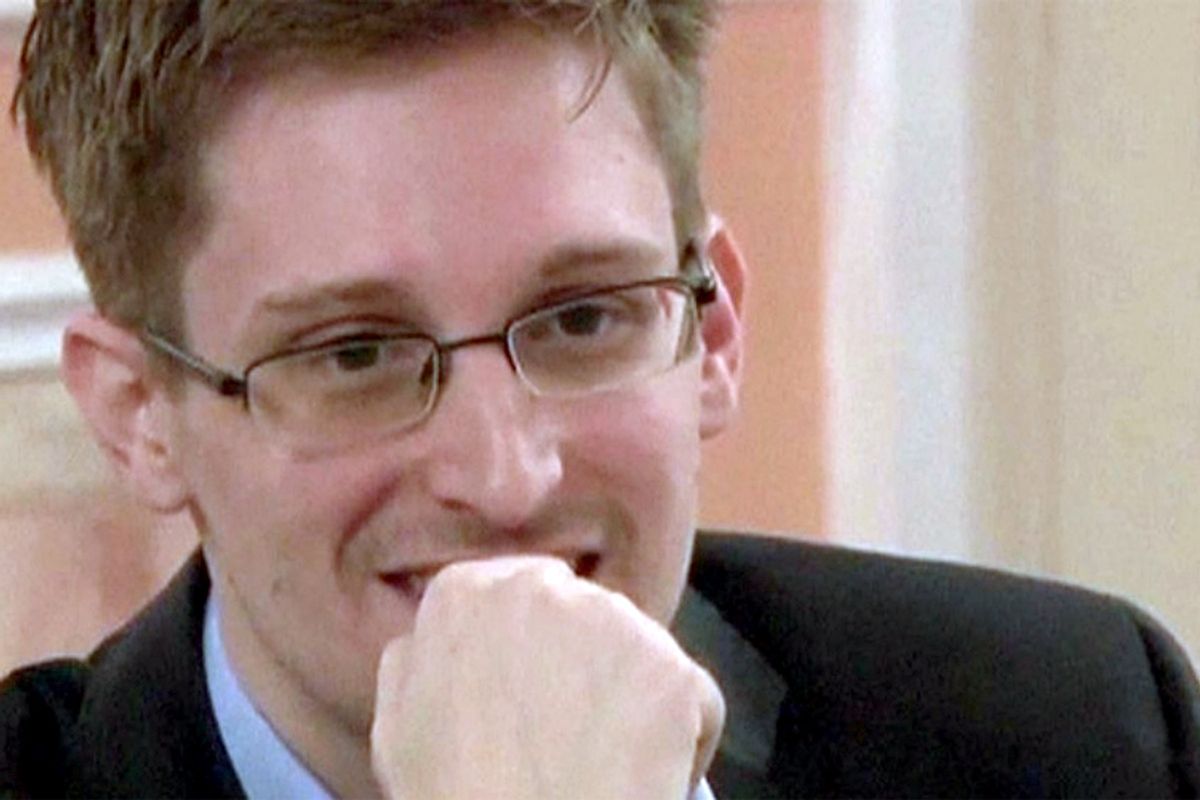You won't find a better summary of the state of modern journalism than NBC's innovative approach to judging the legacy of Edward Snowden. As part of the network's multi-prong promotional blitzkrieg for Wednesday night's broadcast of anchor Brian Williams' interview with the 21st century's most famous whistle-blower, NBC is conducting a "hashtag poll."
Edward Snowden: #Traitor or #Patriot.
If only it were so simple.
Here's a radical suggestion: Maybe he's both. Maybe he's someone who broke the law and betrayed his oath because he believed that the government abuses he was exposing were themselves an unconstitutional betrayal of the American people.
Americans have never been particularly good at embracing contradictions and complexity. The notion that Edward Snowden could simultaneously be a traitor and a patriot disappoints and bewilders our primal Manichaean impulses. But let's try a little experiment.
First, here is Secretary of State John Kerry's response to the interview tidbits leaked by NBC so far.
The bottom line is this is a man who has betrayed his country, who is sitting in Russia, an authoritarian country, where he has taken refuge. He should man up and come back to the United States if he has a complaint about what’s the matter with American surveillance, come back here and stand in our system of justice and make his case. But instead he is just sitting there taking potshots at his country, violating his oath that he took when he took on the job he took, and betraying, I think, the fundamental agreement that he entered into when he became an employee. And the fact is he has damaged his country very significantly in many, many ways. He has hurt operational security. He has told terrorists what they can now do to be able to avoid detection. And I find it sad and disgraceful.
Them's fighting words! We could have a nice little argument about whether they carry more or less weight, given Kerry's own history as a prominent protester against the Vietnam War. On the one hand, there are plenty of people on the right who believe to this day that Kerry's denunciation of the war, complete with such symbolic gestures as the moment when he and 1,000 other veterans threw away their medals and ribbons, was "sad and disgraceful." On the other hand, you could also argue that Kerry stayed home and faced the music, such as it was.
But of course, as the Press Freedom Foundation's Trevor Timm pointed out last December, people who are charged with violation of the Espionage Act, do not get a chance to make their case to the general public in court.
"If Edward Snowden comes back to the US to face trial," wrote Timm, "he likely will not be able to tell a jury why he did what he did, and what happened because of his actions. Contrary to common sense, there is no public interest exception to the Espionage Act. Prosecutors in recent cases have convinced courts that the intent of the leaker, the value of leaks to the public, and the lack of harm caused by the leaks are irrelevant—and are therefore inadmissible in court."
What happened because of his actions. That is the critical point. Again, Timm makes the case:
If the prosecution had their way, Snowden would also not be able to explain to a jury that his leaks sparked more than two dozen bills in Congress, and half a dozen lawsuits, all designed to rein in unconstitutional surveillance. He wouldn’t be allowed to explain how his leaks caught an official lying to Congress, that they’ve led to a White House review panel recommending forty-six reforms for US intelligence agencies, or that they've led to an unprecedented review of government secrecy. He wouldn't be able to talk about the sea change in the public's perception of privacy since his leaks, or the fact that a majority of the public considers him a whistleblower.
He might not even be able to bring up the fact that a US judge ruled that surveillance he exposed was ruled to likely be unconstitutional.
The jury would also not be able to hear how there’s been no demonstrable harm to the United States since much of this information has been published. And if the prosecution was able to prove there was some harm to the US, Snowden wouldn’t be able to explain that the enormous public benefits of these disclosures far outweighed any perceived harm.
Edward Snowden exposed wrongdoing by the U.S. government. That is an act of patriotism. By doing so, he broke his oath of loyalty to the U.S. government. That is an act of treachery. We all get to make our own decisions as to how we weigh these factors in the balance, or whether in this case, the ends justify the means.
But it's certainly not as simple as John Kerry paints. And the man who testified before Congress in 1971 that "this administration has done us the ultimate dishonor ..." in its prosecution of the Vietnam War ought to know better.



Shares